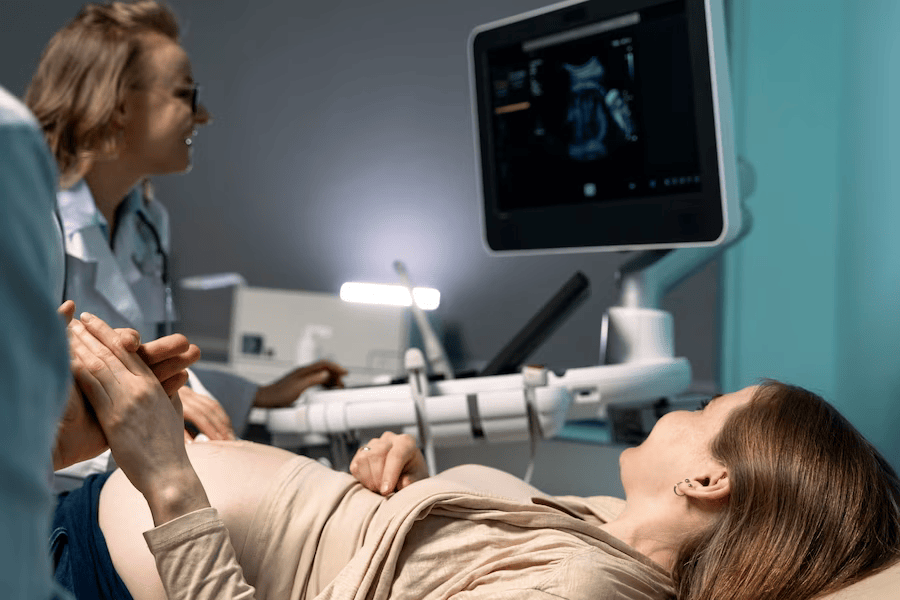Diagnosis and Treatment of PCOD/ PCOS
Diagnosis of PCOD/ PCOS
Diagnosis of patients suspected of having PCOS includes a thorough history and physical examination, assessment for the presence of hirsutism, ovarian ultrasonography, and hormonal testing. However, BMI level also needs to be checked, followed by a lab test of insulin, blood sugar, and hormonal level. The diagnosis helps to determine whether PCOS is present or not. Some of the common diagnostic tests are as follows -
Physical exam - During the physical exam, the doctor checks your blood pressure and waist size, they may also check your skin for extra hair growth, acne, and discoloured skin.
Pelvic ultrasound (sonogram) - It is performed to examine the female reproductive areas- vagina, cervix, uterus, and fallopian tube. Doctors check the status of your ovaries and the thickness of the lining of the uterus. The imaging report should specifically include ovarian volumes, follicle counts, and any other relevant information, such as the presence of a dominant follicle or corpus luteum.
Blood test - It helps assess the level of hormones linked to PCOD/PCOS. The blood test can help you understand cholesterol and triglyceride levels.
Screening - This test is usually performed to screen the mental health conditions like- depression, anxiety, and obstructive sleep apnea.
However, early diagnosis will help in treating the condition more efficiently. We suggest consulting your gynaecologist as soon as you experience symptoms like- skipped and irregular periods, acne, or hair growth on the back or face, consult the best gynaecologists and get yourself checked.
Treatment of PCOD & PCOS -
The treatment procedure for PCOD/PCOS varies from woman to woman, however, there are some factors that can influence the treatment procedure like- age and severity of the condition.
Lifestyle changes - It is very important to practice a healthy lifestyle to avoid various health issues. To treat PCOD-PCOS, your healthcare providers recommend you a low-calorie diet combined with moderate exercise. A slight reduction in your weight might improve your condition. Weight loss help in increasing the effectiveness of medication that is prescribed for PCOS.
Medications - Healthcare professionals usually recommend a few medications to improve your menstrual cycle and improve the condition of PCOD-PCOS.
Birth control pills – These pills contain both estrogen and progestin hence they help in decreasing androgen production and regulating estrogen. Regulating your hormones can help in reducing the risk of endometrial cancer and correct irregular bleeding, excess hair growth, and acne.
Progestin therapy – Doctors may administer a single course of progestin before ovulation induction. Progestin leads to thickening in the lining of the uterus. Without continuous progestin administration to maintain the thickening, the uterine lining is sloughed off, and bleeding begins. It is usually performed to simulate the bleeding that occurs at the beginning of the monthly menstrual cycle.
Surgical method - In the surgical method, laparoscopic ovarian drilling is performed, in this method doctor target the areas where the ovary is producing male hormones and uses a laser to puncture it out. In the surgical method, there is a higher chance of permanent ovary damage. It is suggested by the doctor when the other treatment options fail to work.
Non-surgical options largely include
Dietary modifications : The first suggestion in PCOD and PCOS is always dietary modifications. Stop junk food. Stop packaged food items. Stop excessive intake of carbohydrates and white bread. Eat healthily, eat fresh, eat local. Especially, eat a lot of fresh green vegetables and home cooked food.
Exercises and weight loss : Continuously work towards your health and get your BMI in control. Stay active and lose weight. Keeping your weight in check can drastically normalize your health and mood. Some of the yoga asana you could practice are:
Sitting badrasan, sleeping badrasan, bhujangasana, sarpasana, anulom vilom and kapalbhati. Some asanas that can help you relax during periods are: vishpanda bhav, anitya bhavana and shavasana.
Medicines : Medicinal treatment differs in different cases. It primarily depends on if/ if not you want kids. Women seeking childbirth may be prescribed: Antiandrogens and fertility drugs.
Whereas, women not desiring childbirth may be prescribed :
Hormone Birth control pills/ SOS medicine (meprate 10 mg) and at times, – antiandrogens.



